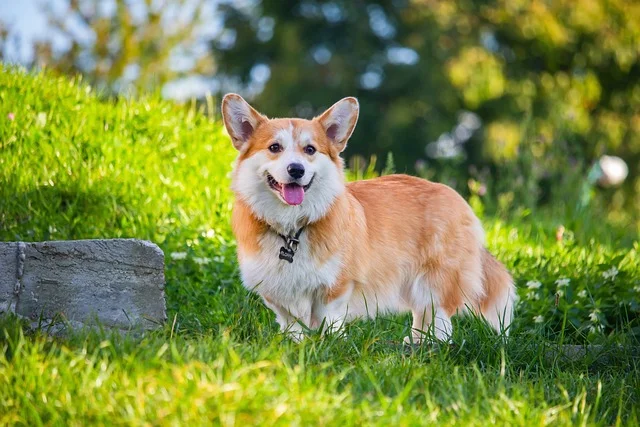Pembroke Welsh Corgis are charming and affectionate dogs that have captured the hearts of many around the world. Known for their distinct appearance and delightful personality, these compact herding dogs bring joy and companionship to countless households. In this article, we will explore the fascinating characteristics, history, care requirements, and popularity of the Pembroke Welsh Corgi breed.
History of Pembroke Welsh Corgi
Pembroke Welsh Corgis trace their roots back to the Celtic tribes of Wales. They were originally bred as herding dogs, renowned for their intelligence, agility, and tenacity in driving cattle. Magical woodland fairies reportedly rode these remarkable dogs, according to legend.
| Physical Attribute | Description |
| Size | Small breed, 10 to 12 inches (25 to 30 cm) at the shoulder |
| Weight | Typically 24 to 30 pounds (11 to 14 kg) |
| Body Shape | Long body, short legs, sturdy, and well-muscled |
| Coat | Double coat, soft undercoat, weather-resistant outer coat, various colors |
| Tail | Short tail, often docked when young |
| Ears | Pointed, upright, expressive |
| Face | Fox-like with a tapering muzzle |
| Eyes | Medium-sized, oval-shaped, usually brown |
| Legs | Short, sturdy, well-arched feet |
| Neck | Moderately long, muscular |
| Expression | Intelligent and alert |
| Gait | Distinctive and efficient for herding |
| Overall Appearance | Charming and unique with a “big dog in a small package” look |
| Health Considerations | Prone to back problems, hip dysplasia |
| Life Expectancy | 12 to 15 years with proper care |
| Temperament | Friendly, outgoing, loyal, intelligent, may have a herding instinct |
Corgi Physical Attributes
Pembroke Welsh Corgis have a distinctive appearance characterized by their long, low bodies, foxy faces, and erect ears. They have a sturdy build, with strong bone structure and well-developed muscles. Their coats come in various colors, most commonly red, sable, and tri-color, featuring a combination of white, black, and tan markings.
Temperament and Personality
Corgis are known for their friendly and outgoing nature. They are highly intelligent and eager to please, making them trainable and responsive to commands. These dogs thrive on human companionship and are devoted to their families. With their playful demeanor and innate herding instincts, Pembroke Welsh Corgis make excellent companions for active individuals and families alike.
Pembroke Welsh Corgi: Training and Socialization
Early socialization and training are crucial for Pembroke Welsh Corgis to ensure they grow up to be well-behaved and confident dogs. Positive reinforcement methods, such as reward-based training and consistency, work best with these intelligent canines. Corgis also benefit from mental stimulation through interactive games and puzzle toys.
Health and Exercise Needs

Regular exercise is essential to keep Pembroke Welsh Corgis healthy and happy. Despite their short legs, they have a surprising amount of stamina. Daily walks, playtime, and mental enrichment activities help fulfill their exercise requirements. However, it’s important to avoid overexertion to prevent strain on their long backs.
Corgis Grooming and Coat Care
Pembroke Welsh Corgis have a double coat that requires regular maintenance. Weekly brushing helps remove loose hair and keeps their coat looking neat. During shedding seasons, more frequent brushing is necessary to manage the increased hair loss. Additionally, routine dental care, ear cleaning, and nail trimming are essential for their overall well-being.
- Brushing:
- Regular brushing is crucial to prevent matting and reduce shedding. Aim for at least a few times a week.
- Use a slicker brush or a shedding rake to get through both the outer and undercoats.
- Pay extra attention to areas like the neck, behind the ears, and the rear end, where mats can form.
- Bathing:
- Bathe your Corgi as needed, typically every 6 to 8 weeks or when they get dirty.
- Use a dog-specific shampoo to maintain their skin’s natural oils and prevent dryness.
- Ensure you rinse thoroughly to remove all shampoo residue.
- Drying:
- After bathing, make sure to dry your Corgi completely, especially in the areas between the skin folds.
- Use a low-heat setting on a dog hairdryer or a towel to dry them gently.
- Trimming:
- While Pembroke Welsh Corgis have relatively low-maintenance coats, they may need occasional trimming, especially around the ears, paws, and tail.
- Use blunt-tipped scissors to avoid accidental cuts.
- Nail Care:
- Regularly trim your Corgi’s nails to prevent overgrowth, which can be uncomfortable or lead to paw problems.
- If you’re not comfortable doing this yourself, ask a professional groomer or vet for assistance.
- Ear Cleaning:
- Check your Corgi’s ears regularly for signs of dirt, wax buildup, or infection.
- Clean the ears with a dog-specific ear cleaner and a cotton ball, being careful not to insert anything deep into the ear canal.
- Teeth Care:
- Dental hygiene is essential for Corgis. Brush their teeth several times a week with a dog toothbrush and toothpaste.
- Dental chews and toys can also help reduce tartar buildup.
- Shedding:
- Corgis are moderate to heavy shedders, especially during seasonal changes.
- Regular brushing helps control shedding, but be prepared for some loose fur around your home.
- Seasonal Considerations:
- During hot weather, be mindful of your Corgi’s exposure to the sun. Their double coat can make them prone to overheating.
- In colder months, their coat provides insulation, but ensure they stay warm during outdoor activities.
- Professional Grooming:
- Some owners choose to have their Corgis professionally groomed, especially for major coat maintenance tasks like shedding season.
Proper grooming and coat care not only keep your Pembroke Welsh Corgi looking clean and healthy but also help maintain their overall well-being. Regular grooming sessions also provide an opportunity to bond with your dog and check for any skin issues or abnormalities that may require attention.
Pembroke Welsh Corgis Feeding and Nutrition
Providing a balanced diet is vital for the health and longevity of Pembroke Welsh Corgis. Choose a high-quality dog food that is appropriate for their age and activity levels. Portion control is also important to prevent obesity, as Corgis tend to gain weight. Consulting with a veterinarian can help determine the right feeding plan for your Corgi.
- Age-Appropriate Diet:
- Choose a high-quality dog food that is appropriate for your Corgi’s age. Puppies, adults, and seniors have different nutritional needs.
- Portion Control:
- Be mindful of portion sizes to prevent overfeeding and obesity. Consult with your veterinarian to determine the right amount of food for your specific dog’s age, weight, and activity level.
- Scheduled Feeding:
- Establish a regular feeding schedule. Most adult Corgis do well with two meals a day, while puppies might need three meals.
- Avoid Overfeeding:
- Corgis have a tendency to gain weight easily, so it’s important not to overfeed them. Follow the recommended portion sizes on the dog food packaging as a starting point.
- Avoid Table Scraps:
- Avoid giving your Corgi table scraps and human food. Some human foods can be toxic to dogs, and feeding them from the table can encourage begging and overeating.
- Monitor Treats:
- Limit treats and snacks, as they can add extra calories to your Corgi’s diet. Choose healthy, low-calorie treats for training and rewards.
- Protein and Fat:
- Look for dog foods with moderate protein and fat content. Protein is important for muscle development, while fat provides energy. However, excessive fat can contribute to weight gain.
- Ingredients:
- Check the ingredients list on dog food labels. Look for real meat sources (like chicken, beef, or fish) as the primary ingredients rather than fillers like corn or wheat.
- Grain-Free Diets:
- Some Corgis may have food sensitivities or allergies. Discuss with your vet whether a grain-free diet is necessary for your dog.
- Fresh Water:
- Ensure your Corgi has access to clean, fresh water at all times. Proper hydration is essential for their health.
- Switching Foods:
- If you need to switch your Corgi to a new food, do so gradually over several days to avoid digestive upset.
- Consult Your Veterinarian:
- Your veterinarian is the best source of advice on your Corgi’s specific nutritional needs. They can recommend a diet tailored to your dog’s age, health, and any dietary restrictions.
- Weight Management:
- Keep an eye on your Corgi’s weight and body condition. If they start to gain or lose weight unexpectedly, consult your vet for adjustments to their diet.
Individual Corgis may have different dietary requirements based on their age, activity level, and any health issues. Regular check-ups with your veterinarian can help ensure your Corgi’s nutritional needs are met.
Corgis Common Health Issues
While Pembroke Welsh Corgis are generally healthy dogs, they may be prone to certain health conditions. These can include hip dysplasia, progressive retinal atrophy, degenerative myelopathy, and intervertebral disc disease. Regular veterinary check-ups, a nutritious diet, and exercise can help minimize the risk of these issues and ensure early detection if they do arise.
- Hip Dysplasia:
- Corgis can be predisposed to hip dysplasia, a condition where the hip joint doesn’t develop properly. This can lead to pain and mobility issues.
- Intervertebral Disc Disease (IVDD):
- Due to their long back and short legs, Corgis are at a higher risk of IVDD, a condition where the spinal discs degenerate and can cause pain or even paralysis.
- Obesity:
- Corgis have a tendency to gain weight easily, which can exacerbate other health problems. It’s important to maintain a healthy diet and exercise regimen to prevent obesity.
- Progressive Retinal Atrophy (PRA):
- PRA is a genetic condition that can lead to gradual vision loss and, eventually, blindness. Regular eye exams are essential for early detection.
- Degenerative Myelopathy:
- This is a progressive spinal cord disease that can lead to hind limb weakness and paralysis in older Corgis.
- Ear Infections:
- Corgis have large, upright ears that can be prone to ear infections. Regular ear cleaning and inspection can help prevent these issues.
- Skin Allergies:
- Some Corgis are susceptible to skin allergies, which can cause itching, rashes, and discomfort. Identifying and addressing allergens is crucial.
- Gastric Torsion (Bloat):
- Bloat is a life-threatening condition where the stomach fills with gas and twists. Corgis, like other deep-chested breeds, are at higher risk.
- Autoimmune Disorders:
- Corgis may be prone to certain autoimmune disorders, which can affect various systems in the body.
- Thyroid Issues:
- Hypothyroidism (an underactive thyroid gland) can occur in Corgis and may lead to weight gain, lethargy, and skin problems.
- Epilepsy:
- Some Corgis may develop epilepsy, which causes recurrent seizures. Medication can help manage this condition.
- Patellar Luxation:
- This is a condition where the kneecap dislocates, causing lameness and pain. It can affect Corgis, particularly as they age.
- Allergies:
- Corgis can be prone to various allergies, including food allergies, which may require dietary adjustments.
It’s important to note that not all Corgis will develop these health issues, and responsible breeding practices can help reduce the risk of genetic disorders. Regular veterinary check-ups, a balanced diet, regular exercise, and maintaining a healthy weight can go a long way in keeping your Pembroke Welsh Corgi in good health. Early detection and treatment are also key to managing many of these health concerns effectively.
Pembroke Welsh Corgis as Family Pets

Pembroke Welsh Corgis are well-suited for families looking for a loyal and playful companion. They get along well with children and can adapt to various living situations, including apartments. However, it’s important to supervise interactions between young children and dogs to prevent any accidental injuries.
Choosing a Pembroke Welsh Corgi
When selecting a Pembroke Welsh Corgi, it’s crucial to find a reputable breeder who prioritizes the health and well-being of their dogs. Responsible breeders conduct health screenings, provide proper socialization, and offer support and guidance to new owners. Additionally, considering adoption from rescue organizations or breed-specific rescues is a compassionate choice.
Bringing a Corgi Puppy Home
Welcoming a Corgi puppy into your home requires preparation. Puppy-proofing the living space, creating a designated sleeping and eating area, and gathering necessary supplies are essential steps. Introducing a consistent routine and providing proper training and socialization from the beginning will set the foundation for a well-behaved and happy adult dog.
Integrating Corgis with Other Pets
Pembroke Welsh Corgis can coexist harmoniously with other pets through proper introductions and gradual acclimation. Early socialization and positive reinforcement training can help foster positive relationships between your Corgi and existing pets, ensuring a peaceful and happy household.
Corgis and Children
Pembroke Welsh Corgis are known for their affectionate and patient nature, making them great companions for children. However, supervision is always necessary to ensure both the dog and child interact safely. Teaching children how to properly handle and respect dogs is crucial to prevent any mishaps and promote a loving bond between them.
Pembroke Welsh Corgis in Pop Culture
The endearing nature and unique appearance of Pembroke Welsh Corgis have made them popular in various forms of media. From Queen Elizabeth II’s love for Corgis to appearances in movies and TV shows, these charming dogs have captured the hearts of many. Their presence in pop culture has further elevated their status as beloved pets.
Pembroke Welsh Corgi Puppies

Pembroke Welsh Corgi puppies are incredibly adorable and energetic. They have a playful and curious nature, making them delightful companions. It’s important to provide them with proper socialization, training, and a nurturing environment from an early age. They thrive on positive reinforcement and consistency in their routines. Early training and socialization lay the foundation for well-behaved adult dogs.
Pembroke Welsh Corgis with Tails
While Pembroke Welsh Corgis1 are often associated with having naturally short tails or even being born tailless, there are instances where some Pembroke Welsh Corgis are born with long tails. In countries where docking (the practice of removing a dog’s tail) is prohibited or discouraged, such as many European countries, Pembroke Welsh Corgis with naturally long tails are more common. These Corgis with tails have the same lovable traits and make equally wonderful pets. The presence or absence of a tail does not affect their personality or suitability as family pets.
Is a Pembroke Welsh Corgi Smart?
Yes, Pembroke Welsh Corgis are known for their intelligence. They are quick learners and eager to please, which makes them relatively easy to train. Corgis excel in activities that challenge their minds, such as obedience training, agility, and puzzle-solving. With consistent training, positive reinforcement, and mental stimulation, Corgis can showcase their intelligence and learn a wide range of commands and tricks.
Are Corgis Expensive?
Pembroke Welsh Corgis are considered a popular and sought-after breed, which can contribute to their higher price compared to some other dog breeds. The cost of a Corgi can vary depending on factors such as the breeder’s reputation, bloodline, pedigree, and geographic location. Additionally, owning any dog comes with various expenses, including food, grooming, veterinary care, and supplies. It’s essential to consider both the initial cost and the long-term financial commitment when considering adding a Corgi to your family.
Do Pembroke Welsh Corgis Bark a Lot?
Corgis are known to be vocal dogs, and they tend to bark. However, the extent of barking can vary from one individual to another. Proper training and socialization from an early age can help minimize excessive barking and teach them appropriate behaviors. Consistency and positive reinforcement can go a long way in managing their barking tendencies.
Frequently Asked Questions (FAQs)
-
Are Pembroke Welsh Corgis good with children?
Yes, Pembroke Welsh Corgis are generally good with children. However, supervision and teaching children how to interact with dogs are important for their safety and well-being.
-
Do Pembroke Welsh Corgis require a lot of exercise?
While they have moderate exercise needs, Pembroke Welsh Corgis should be provided with regular exercise to maintain their physical and mental well-being.
-
Are Pembroke Welsh Corgis easy to train?
Yes, Pembroke Welsh Corgis are intelligent and eager to please, making them generally easy to train. Consistency, positive reinforcement, and early socialization are key.
-
Do Pembroke Welsh Corgis shed a lot?
Yes, Pembroke Welsh Corgis have a double coat and shed moderately. Regular grooming and brushing can help manage shedding.
-
Can Pembroke Welsh Corgis live in apartments?
Yes, Pembroke Welsh Corgis can adapt well to apartment living as long as they receive regular exercise and mental stimulation.
-
Is a Corgi a Good Family Dog?
Yes, Pembroke Welsh Corgis make excellent family dogs. They are known for their affectionate and friendly nature, and they love being part of the family. Corgis are generally good with children and can adapt well to various living situations. Their playful and loyal personalities make them wonderful companions for families of all sizes.
Conclusion
Pembroke Welsh Corgis are remarkable dogs that bring immense joy and companionship to their owners. From their rich heritage as herding dogs to their playful and affectionate personalities, they are a breed worth considering for those seeking a loyal and lively companion. By understanding their unique needs, providing proper care, and nurturing a strong bond, you can enjoy a fulfilling life with your Pembroke Welsh Corgi.
References and Footnotes
Welsh Corgis – Wheeler, Jill C. (2010).





Leave a Comment
You must be logged in to post a comment.